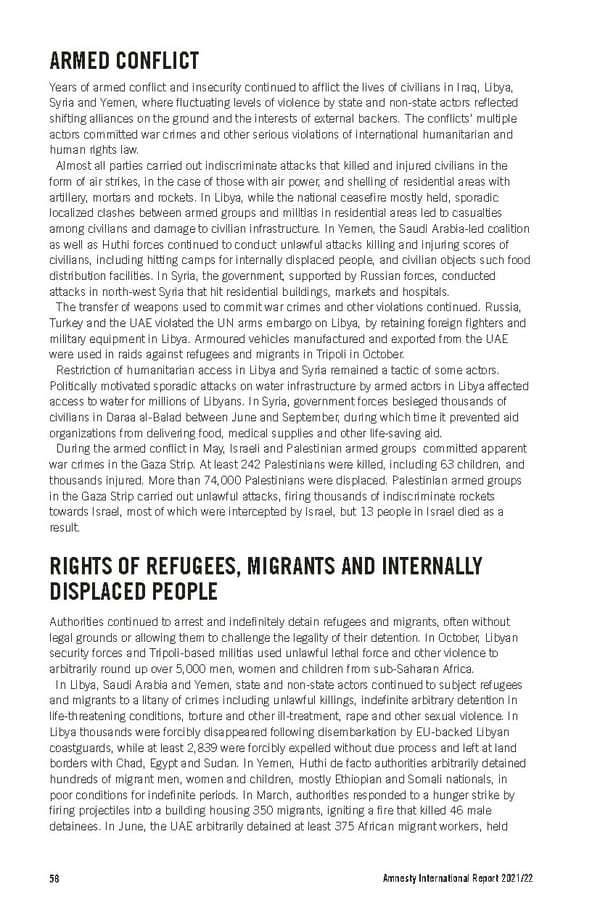ARMED CONFLICT Years of armed conflict and insecurity continued to afflict the lives of civilians in Iraq, Libya, Syria and Yemen, where fluctuating levels of violence by state and non-state actors reflected shifting alliances on the ground and the interests of external backers. The conflicts’ multiple actors committed war crimes and other serious violations of international humanitarian and human rights law. Almost all parties carried out indiscriminate attacks that killed and injured civilians in the form of air strikes, in the case of those with air power, and shelling of residential areas with artillery, mortars and rockets. In Libya, while the national ceasefire mostly held, sporadic localized clashes between armed groups and militias in residential areas led to casualties among civilians and damage to civilian infrastructure. In Yemen, the Saudi Arabia-led coalition as well as Huthi forces continued to conduct unlawful attacks killing and injuring scores of civilians, including hitting camps for internally displaced people, and civilian objects such food distribution facilities. In Syria, the government, supported by Russian forces, conducted attacks in north-west Syria that hit residential buildings, markets and hospitals. The transfer of weapons used to commit war crimes and other violations continued. Russia, Turkey and the UAE violated the UN arms embargo on Libya, by retaining foreign fighters and military equipment in Libya. Armoured vehicles manufactured and exported from the UAE were used in raids against refugees and migrants in Tripoli in October. Restriction of humanitarian access in Libya and Syria remained a tactic of some actors. Politically motivated sporadic attacks on water infrastructure by armed actors in Libya affected access to water for millions of Libyans. In Syria, government forces besieged thousands of civilians in Daraa al-Balad between June and September, during which time it prevented aid organizations from delivering food, medical supplies and other life-saving aid. During the armed conflict in May, Israeli and Palestinian armed groups committed apparent war crimes in the Gaza Strip. At least 242 Palestinians were killed, including 63 children, and thousands injured. More than 74,000 Palestinians were displaced. Palestinian armed groups in the Gaza Strip carried out unlawful attacks, firing thousands of indiscriminate rockets towards Israel, most of which were intercepted by Israel, but 13 people in Israel died as a result. RIGHTS OF REFUGEES, MIGRANTS AND INTERNALLY DISPLACED PEOPLE Authorities continued to arrest and indefinitely detain refugees and migrants, often without legal grounds or allowing them to challenge the legality of their detention. In October, Libyan security forces and Tripoli-based militias used unlawful lethal force and other violence to arbitrarily round up over 5,000 men, women and children from sub-Saharan Africa. In Libya, Saudi Arabia and Yemen, state and non-state actors continued to subject refugees and migrants to a litany of crimes including unlawful killings, indefinite arbitrary detention in life-threatening conditions, torture and other ill-treatment, rape and other sexual violence. In Libya thousands were forcibly disappeared following disembarkation by EU-backed Libyan coastguards, while at least 2,839 were forcibly expelled without due process and left at land borders with Chad, Egypt and Sudan. In Yemen, Huthi de facto authorities arbitrarily detained hundreds of migrant men, women and children, mostly Ethiopian and Somali nationals, in poor conditions for indefinite periods. In March, authorities responded to a hunger strike by firing projectiles into a building housing 350 migrants, igniting a fire that killed 46 male detainees. In June, the UAE arbitrarily detained at least 375 African migrant workers, held Amnesty International Report 2021/22 58
 Amnesty International Report 2021/22 Page 57 Page 59
Amnesty International Report 2021/22 Page 57 Page 59